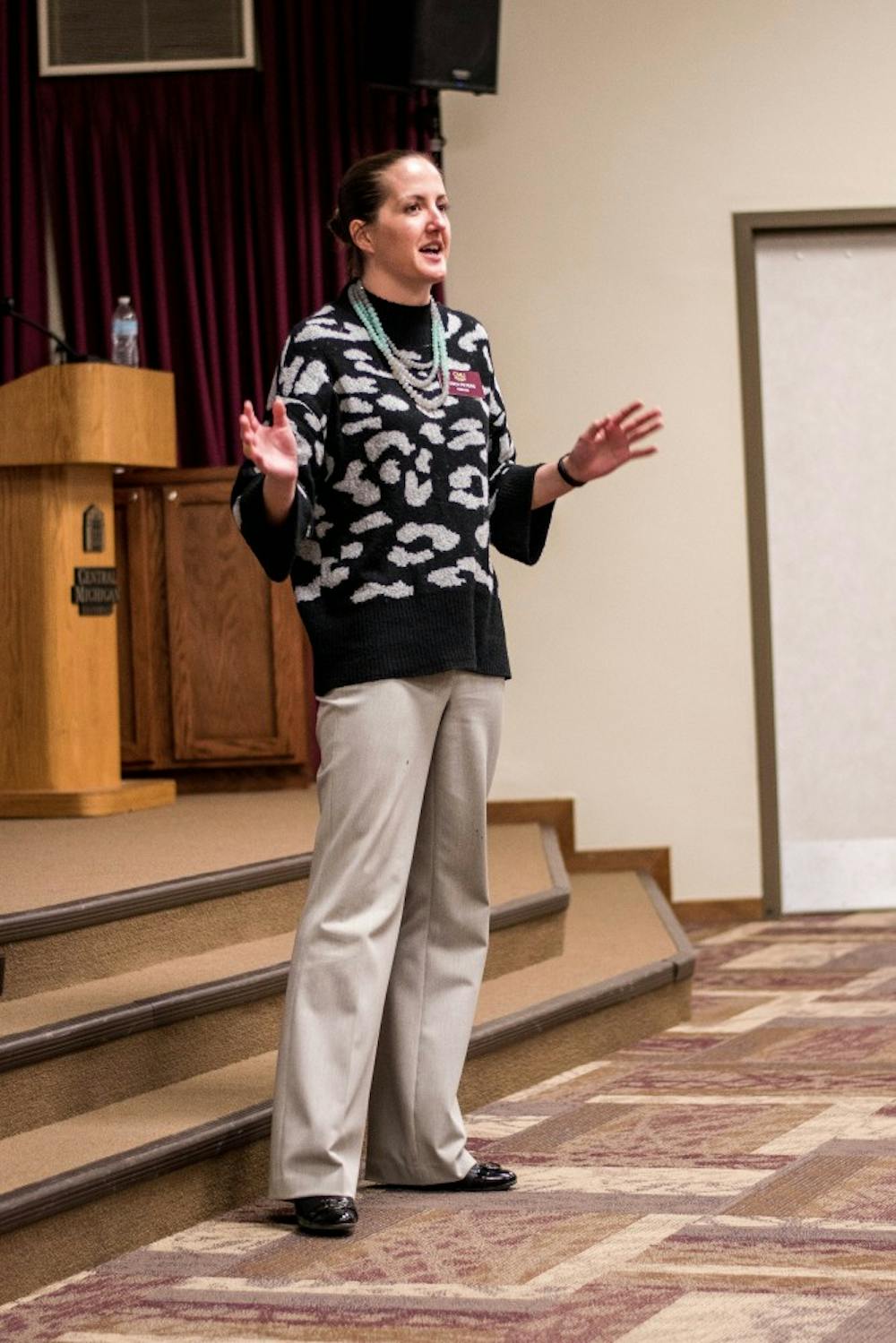Ombudsperson Erica Peters helps students advocate for themselves

Ombudsperson Erica Peters speaks to a Student Government Association meeting in the Bovee University Center Auditorium on March 25.
Ombudsperson Erica Peters has learned firsthand what it means to be a “third party.”
The Ombuds office is an informational resource available on Central Michigan University's campus that provides impartial, confidential and informal support for student-related matters. Peters works as a neutral third-party to provide an outside perspective when students need clarification on academic-related issues.
“It’s tricky for me personally because I have to try really hard to be that neutral presence and give objective feedback,” Peters said. “People come in with really terrible stories and high emotions, and it’s very difficult to not feel that with them. I can emphasize and hear you out, but that’s where I have to draw the line.”
Peters has worked as an ombudsperson since the CMU Student Ombuds Office became a full-time office in December 2016. The office is located in Ronan 220.
The office is available to online, global and main campus students. It deals in mediation and encouraging equitable treatment across the university community.
“Part of me wishes I could operate in a capacity where I could advocate for or on behalf of (visitors), but that would defeat the purpose of the office,” Peters said.
Before becoming the official and only ombudsperson at CMU, Peters was an online program administrator. She dealt with similar concerns then, but became a member of the International Ombudsperson Association and helped further establish the office.
Peters said that people mainly want to discuss faculty and staff behavior, service quality and university procedures on academic integrity, grade grievances and course drop and withdrawal policy.
“I’ll hear anyone out, and I’ll leave it up to the visitor as to how far they want to pursue it,” Peters said. “If you want to come in and tell me how frustrated you are in this class and that’s all you want to do, that’s fine, that’s all we have to do. But if you want someone to know how frustrated you are and prevent other students from having the same experience, I let the student drive as much as possible.”
Although Ombuds can notify students of their rights within the university, the office does not provide legal advice and cannot change administrative decisions.
Peters spoke during the March 25 Student Government Association meeting to promote the Ombuds office. SGA Senator and Indiana junior Yvon Bergner knew of the office prior to the meeting, but he was happy to see the office being promoted.
As a transfer and first-generation college student, Bergner was curious to learn about the resources that CMU offers.
“I went to as many offices as I could on campus and (asked), ‘hey, what do you guys do, who are you and how do you affect me as a student?’” he said.
In his search, Bergner found out about the ombuds office. He said he knew that an office like it existed but never knew the name that went with its role.
“Some students know about Ombuds, and if they do, it’s likely because they’ve used it,” Bergner said. “Ombuds is an informational resource - they’re a middle man and they stick with that. They’re a neutral ground. When you go to somebody, you look for (neutrality) so you can get information about what’s what and how to approach a situation.”
Although Bergner has not personally used the office, he recommends Ombuds as a resource and wants more students to be aware of the office.
Assistant Director of Student Success Jeff Hyames has seen the Ombuds transition from a part-time to full-time position as the backup ombudsperson. He attributes that change to there being a higher need and more student use of the office.
“Your job is to be a student, not try to figure out policy and procedures,” Hyames said. “(The office) can help you navigate – not tell you what to do, not make it all better, not give you the answer you’re looking for – but give you clarification and additional resources you may not know about.”
The majority of Peters’ visitors are main-campus, domestic students, but she hopes to expand the office to staff and faculty beyond policy consultation.
In this past academic year, Peters has worked with 200 people. That number varies, but Peters hopes to make the office more known and available to the university community.





